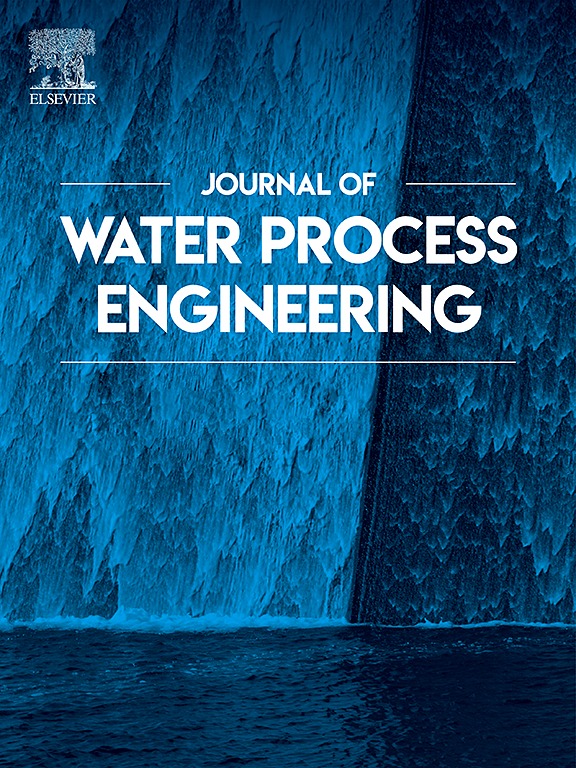Enhanced removal of tetracycline from water using MgO-modified g-C3N4 composite: Synthesis optimization and mechanism investigation
IF 6.3
2区 工程技术
Q1 ENGINEERING, CHEMICAL
引用次数: 0
Abstract
Tetracycline(TC) is a typical pharmaceutical and personal care product (PPCP) that harms ecological health due to its impact on human allergic reactions, bacterial resistance, and environmental microbiota. Thus, developing environmentally friendly, efficient, and suitable methods to eliminate TC and inactivate bacteria in aquatic environments is becoming essential. A facile hydrothermal approach was developed to synthesize MgO-modified g-C3N4 composites for efficient TC removal from water. The as-prepared composites were thoroughly characterized by BET, SEM, XRD, and XPS analyses, confirming the successful incorporation of MgO into the g-C3N4 framework. Under optimal conditions (1:1 MgO/g-C3N4 ratio, 150 °C synthesis temperature), the composite achieved 84.89 % TC removal within 90 min under visible light, substantially outperforming pristine materials (MgO, g-C3N4). The composite maintained removal efficiency above 70 % after six successive cycles, demonstrating excellent stability. Mechanistic investigations identified O2•− as the dominant reactive species, with h+ playing a secondary role. Analysis of atomic Fukui indices revealed preferential radical attack at C7, O20, and N24 sites, leading to TC degradation through hydroxylation and cyclization pathways. The composite showed promising performance in actual river water treatment, suggesting potential for practical applications. This work provides insights for developing efficient photocatalytic materials for pharmaceutical pollutant removal from water.

求助全文
约1分钟内获得全文
求助全文
来源期刊

Journal of water process engineering
Biochemistry, Genetics and Molecular Biology-Biotechnology
CiteScore
10.70
自引率
8.60%
发文量
846
审稿时长
24 days
期刊介绍:
The Journal of Water Process Engineering aims to publish refereed, high-quality research papers with significant novelty and impact in all areas of the engineering of water and wastewater processing . Papers on advanced and novel treatment processes and technologies are particularly welcome. The Journal considers papers in areas such as nanotechnology and biotechnology applications in water, novel oxidation and separation processes, membrane processes (except those for desalination) , catalytic processes for the removal of water contaminants, sustainable processes, water reuse and recycling, water use and wastewater minimization, integrated/hybrid technology, process modeling of water treatment and novel treatment processes. Submissions on the subject of adsorbents, including standard measurements of adsorption kinetics and equilibrium will only be considered if there is a genuine case for novelty and contribution, for example highly novel, sustainable adsorbents and their use: papers on activated carbon-type materials derived from natural matter, or surfactant-modified clays and related minerals, would not fulfil this criterion. The Journal particularly welcomes contributions involving environmentally, economically and socially sustainable technology for water treatment, including those which are energy-efficient, with minimal or no chemical consumption, and capable of water recycling and reuse that minimizes the direct disposal of wastewater to the aquatic environment. Papers that describe novel ideas for solving issues related to water quality and availability are also welcome, as are those that show the transfer of techniques from other disciplines. The Journal will consider papers dealing with processes for various water matrices including drinking water (except desalination), domestic, urban and industrial wastewaters, in addition to their residues. It is expected that the journal will be of particular relevance to chemical and process engineers working in the field. The Journal welcomes Full Text papers, Short Communications, State-of-the-Art Reviews and Letters to Editors and Case Studies
 求助内容:
求助内容: 应助结果提醒方式:
应助结果提醒方式:


